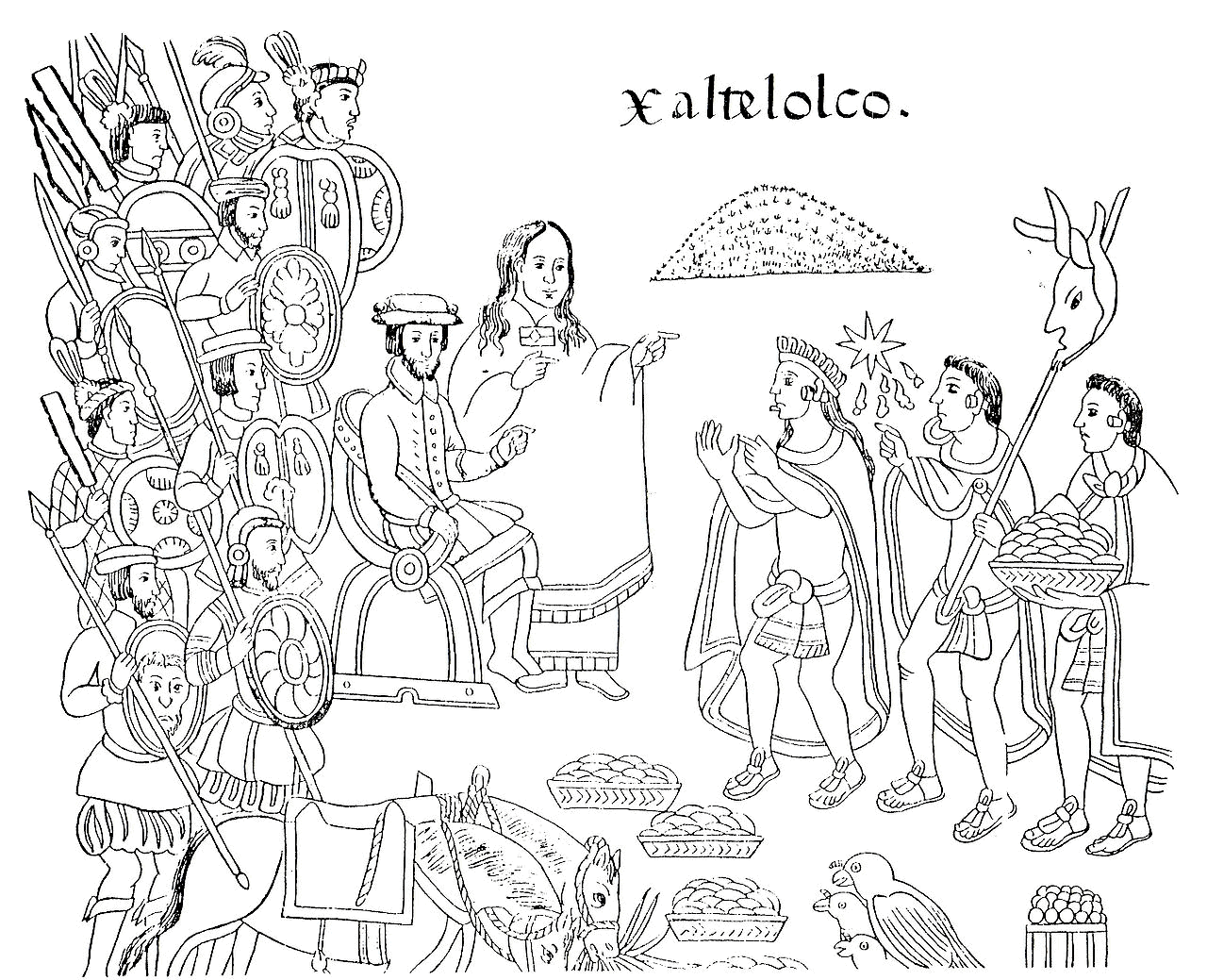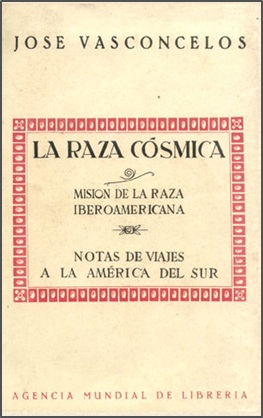


メキシコの白人/先住民主義
Los blancos y los indígenas en México
オ クタビオ・パスのコルテスとマリ ンチェの結婚と、チンガーダ(chingada)=犯され女の末裔(『孤独の迷宮』)[→オクタビオ・パス]



La Malinche (椅子に座っているコルテスの傍らに立つマリンチェ(トラスカラの 古写本より))
***
・ 宇宙人種(raza cosmica)
La raza
cósmica es
un ensayo publicado en 1925 por el filósofo y académico mexicano José
Vasconcelos Calderón, secretario de Educación Pública (1921-1924) y
candidato presidencial en 1929.Vasconcelos expresó la ideología de la
"quinta raza" (o la raza de bronce ) del continente americano, una
aglomeración de todas las razas del mundo sin distinción alguna para
construir una nueva civilización (Universópolis) y gente del mundo
entero transmitiendo su conocimiento. Según el autor, los habitantes de
Iberoamérica (excolonias de España y Portugal) poseen factores
territoriales, raciales y espirituales para iniciar la "era universal
de la humanidad".Señalando que las ideas de Charles Darwin son "teorías
científicas" solo creadas para validar, explicar y justificar la
superioridad racial y la represión a otras, Vasconcelos intenta
rechazar esas teorías y reconoce en sus propias palabras un esfuerzo
ideológico para mejorar la moral cultural de la "raza oprimida" al dar
una teoría optimista del futuro desarrollo de una "raza cósmica". - https://goo.gl/d5FH05
バ
スコンセロスは、アメリカ大陸の
「第5の民族」(あるいは青銅の民族)というイデオロギーを表明している。著者によれば、イベロ・アメリカ(スペインとポルトガルの旧植民地)の住民は、
「人類普遍の時代」を開始するための領土的、人種的、精神的要因を持っているという。
ヴァスコンセロスは、チャールズ・ダーウィンの考えが、人種的優越と他者への抑圧を正当化し、説明し、正当化するために作られた「科学理論」であることを
指摘し、これらの理論を否定し、「宇宙人種」の将来の発展について楽観的な理論を与えることによって、「抑圧された人種」の文化的モラルを向上させようと
するイデオロギー的努力を彼自身の言葉で認めている。
| La raza
cósmica (The Cosmic Race) is a Spanish-language book written and
published in 1925 by Mexican philosopher, secretary of education, and
1929 presidential candidate José Vasconcelos to express the ideology of
a future "fifth race" in the Americas; an agglomeration of all the
races in the world with no respect to color or number to erect a new
civilization: Universópolis. Claiming that social Darwinist and racialist ideologies are only created to validate, explain, and justify ethnic superiority and to repress others, Vasconcelos attempts to refute these theories and goes on to recognize his words as being an ideological effort to improve the cultural morale of a "depressed race" by offering his optimistic theory of the future development of a cosmic race. As he explains in his literary work, armies of people would then go forth around the world professing their knowledge. Vasconcelos continues to say that the people of the Iberian regions of the Americas (that is to say, the parts of the continent colonised by Portugal and Spain) have the territorial, racial, and spiritual factors necessary to initiate the "universal era of humanity". |
La raza
cósmica(宇宙人種)は、メキシコの哲学者、教育長官、1929年の大統領候補者ホセ・バスコンセロスによって1925年に書かれ出版されたスペイ
ン語の本で、アメリカ大陸における将来の「第5の人種」のイデオロギーを表現している: ユニヴェルソポリスである。 ヴァスコンセロスは、社会ダーウィン主義や人種主義のイデオロギーは、民族の優越性を正当化し、説明し、正当化し、他者を抑圧するために生み出されたもの でしかないと主張し、これらの理論に反論を試みるとともに、宇宙民族の将来の発展という楽観的な理論を提示することで、「落ち込んだ民族」の文化的モラル を向上させるためのイデオロギー的努力であると認識している。 彼の文学作品の中で説明されているように、人々の軍隊はその知識を公言して世界中を駆け巡るだろう。ヴァスコンセロスは、アメリカ大陸のイベリア地域(つまり、ポルトガルとスペインによって植民地化された大陸の一 部)の人々は、「人類の普遍的な時代」を開始するのに必要な領土的、人種的、精神的な要素を持っていると言い続けている。 |
| Critiques The ideas put forth in La raza cósmica are held to be rather controversial.[1][2][3] For example, Celarent notes that many felt that the work and its author were exceedingly racist, such as when Vasconcelos' wrote “the Chinese, who under the holy counsel of Confucian morals multiply like rats."[2](p1000)[4](p19) However, when it was first written, Vasconcelos' piece was to be a reaction or refutation of Social Darwinism and biological racism, although Juárez suggests that Vasconcelos' may have added to Mexican Conservative thought by doing so.[1](p51) In order to refute the ideas of racial superiority, Vasconcelos conceptualized a fifth race, the cosmic race, something that is an agglomeration of all of the other races.[4] As Palacios notes, this race is called cosmic as it suggests that humanity will become combined and reach its destiny as inferior traits are lost through synthesis and a new Spiritual Era is reached.[3](p420) Juárez offers a critique to this concept against biological racism by suggesting that Vasconcelos reduced non-white races in order to uphold "Anglo-Saxon propaganda" and "Nordic educational, social and governmental systems."[1](p70) Another critique is offered by Palacios on the basis that while Vasconcelos did not support so-called "negative eugenics" or Social Darwinism, he did advocate for a "eugenics of aesthetics." Palacios describes eugenics of aesthetics as a survival of the beautiful, as compared to Darwin's survival of the fittest.[3](p422) Palacios suggests that this viewpoint alongside other comments made by Vasconcelos show that he held some races as better than others.[3](p422) |
批評 例えば、セラレントは、ヴァスコンセロスが「儒教的道徳の聖なる助言の下で、ネズミのように増える中国人」と書いたように、この作品とその作者は非常に人 種差別的であると多くの人が感じていると指摘している。 「[2](p1000)[4](p19)しかし、書かれた当初、ヴァスコンセロスの作品は、社会ダーウィニズムと生物学的人種主義に対する反動、あるいは 反論であるはずだったが、フアレスは、ヴァスコンセロスがそうすることによってメキシコ保守思想に拍車をかけた可能性を示唆している[1](p51)。 ヴァスコンセロスは、人種的優越性の考えに反論するために、他のすべての人種の集合体である第5の人種、宇宙人種を概念化した[4]。パラシオスが指摘す るように、この人種が宇宙人種と呼ばれるのは、人類が統合され、劣った形質が統合によって失われ、新たな精神の時代に到達することによって、その運命に到 達することを示唆しているからである。 [3](p420)フアレスは生物学的人種差別に対するこの概念に対して、ヴァスコンセロスが「アングロサクソンのプロパガンダ」と「北欧の教育、社会、 政府のシステム」を支持するために非白人人種を減らしたという批判を展開している[1](p70)。 もう一つの批判は、ヴァスコンセロスがいわゆる「負の優生学」や社会ダーウィニズムを支持しなかった一方で、「美学の優生学」を提唱したという根拠に基づ いてパラシオスによって提示される。パラシオスは、美学の優生学を、ダーウィンの適者生存と比較して、美しいものの生存と表現している[3] (p422)。パラシオスは、ヴァスコンセロスの他の発言と並んで、この視点が、彼がある人種を他の人種よりも優れていると考えていたことを示していると 指摘している[3](p422)。 |
| Usage of phrase The title La raza cósmica embodies the notion that traditional, exclusive concepts of so-called "race" and nationality can be transcended in the name of humanity's common destiny. It originally referred to a movement by Mexican intellectuals during the 1920s who pointed out that so-called "Latin" Americans have the blood of all the world's so-called "races": European, Indigenous Native Americans, and Africans, thereby transcending the peoples of the "Old World". Vasconcelos also alluded to the term when he coined the National Autonomous University of Mexico's motto: "Por mi raza hablará el espíritu" ('Through my race the spirit will speak'). Contemporary usage Contemporarily La raza cósmica has become about mestizaje (racial mixture) and mestizos/Métis rather than the creation of the cosmic race.[3] Palacios describes how the Chicano movement appropriated and transformed the ideas of Vasconcelos' fifth race into that of Mexican national thought, focusing on the words from a poem by Alurista, "a bronze people [an ethnic alloy] with a bronze culture [an alloy of traditions]."[3](p428) Palacios also gives the example of Valdez, a Chicano writer, who focused on trying to create a society that was less Eurocentric or Western rather than following Vasconcelos' idea to evolve the Indigenous and mixed into something better.[3](p430) Mestizaje as the contemporary notion of cosmic race is shown in The Land of the Cosmic Race by Christina A. Sue. King and Moras give an overview of this piece and claim that Mexico has been re-founded on 3 pillars: mestizaje, non-racism, and non-blackness.[5](p249)[6](p956) They claim mestizaje is the new cultural identity of Mexico; non-racism is applied through this fact, as a place can't be racist if everyone is a mestizo (mixed race); and non-blackness is the removal of blackness from the culture, as a race category, and from the make-up of mestizos.[5](249) Both King and Moras note that Sue suggests that the removal of blackness allows the population focus on uplifting their Mexican identity, which she claims has more basis in whiteness.[5](249-50)[6](p457) |
フレーズの使い方 La raza cósmica(ラ・ラサ・コスミカ)というタイトルは、いわゆる 「人種 」や 「国籍 」といった伝統的で排他的な概念は、人類共通の運命の名の下に超越できるという概念を体現している。もともとは、1920年代にメキシコの知識人たちが、 いわゆる 「ラテン 」アメリカ人は世界中のいわゆる 「人種 」の血を受け継いでいると指摘した運動を指す: いわゆる 「ラテン 」アメリカ人は、ヨーロッパ人、アメリカ先住民、アフリカ人など、世界のいわゆる 「人種 」の血を受け継いでおり、それによって 「旧世界 」の人々を超越していると指摘したのである。 また、バスコンセロスは、メキシコ国立自治大学のモットーである 「Por mi raza hablará el espíritu」(「私の人種を通して精神は語る」)を作った際にも、この言葉を引用している。 現代の用法 パラシオスは、チカーノ運動がどのようにヴァスコンセロスの第5の民族の思想をメキシコの国家思想に転用し、変容させたかについて、アルリスタの詩の中の 「青銅の文化(伝統の合金)を持つ青銅の民(民族の合金)」という言葉に注目して述べている[3]。 「パラシオスはまた、チカーノの作家であるバルデスの例を挙げるが、彼は、土着的なものと混合的なものをより良いものに進化させるというヴァスコンセロス の考えに従うのではなく、よりヨーロッパ中心的でない、あるいは西洋的でない社会を作ろうとすることに重点を置いていた[3](p430)。 宇宙人種の現代的概念としてのメスティサヘは、クリスティーナ・A・スーの『宇宙人種の国』に示されている。キングとモラスはこの作品の概要を述べ、メキ シコはメスティサヘ、非人種主義、非黒人性という3つの柱で再創造されたと主張する。 [メスティサヘとはメキシコの新しい文化的アイデンティティであり、非人種主義とはこの事実を通じて適用されるものであり、全員がメスティソ(混血)であ れば人種差別的な場所にはなりえないということである。 [5](249)キングもモラスも、スーが、黒色性を除去することで、人々がメキシコ人のアイデンティティを高めることに集中できるようになることを示唆 していることに注目している[5](249-50)[6](p457)。 |
| Race
and ethnicity in Latin America Race of the Future Racial democracy Postracialism Chicano Mixed Race Day Hispanic Latin America La Raza |
ラテンアメリカの人種と民族 未来の人種 人種民主主義 ポスト人種主義 チカーノ 混血の日 ヒスパニック ラテンアメリカ ラ・ラザ |
| https://en.wikipedia.org/wiki/La_raza_c%C3%B3smica |
「ス
ペイン語のラ・ラサ(「民衆」または「共同体」、直訳すると「人種」)という表現は、歴史的にスペイン帝国に由来する民族的または人種的単位とみなされ
る混血集団(主に西半球に限定されるわけではないが)、およびスペインのアメリカ大陸植民地化におけるアメリカ大陸の先住民族との人種的混血のプロセスを
指すために使用されてきた。
この用語は、20世紀初頭から半ばにかけてはラテンアメリカでは広く使われていなかったが、1968年以降、チカニスモとユナイテッド・ファーム・ワー
カー組織において再定義され、再利用されている。この混血の用語は、ホセ・ヴァスコンセロスによる「ラ・ラサ・コスミカ」への言及として生まれたが、現在
ではこの文脈で使われることも、アメリカ合衆国のメキシコ系アメリカ人、先住民の権利運動や活動家による「ラ・ラサ・コスミカ」イデオロギーと関連付けら
れることもない。」(→「ラサ」)
****
『孤 独の迷宮』
El laberinto de la soledad, por Octavio Paz, 1914-1998.
El laberinto de la soledad es un libro publicado en 1950 por el escritor mexicano Octavio Paz (ganador del Premio Nobel de Literatura en 1990). Es el reflejo de las preocupaciones de su autor en torno al mexicano, su psicología y su moralidad. En esta obra, busca cuáles son los orígenes y las causas del comportamiento del mexicano tanto individualmente como en lo colectivo, así como su forma de afrontar y desafiar al mundo; búsqueda que desemboca en el inconsciente como origen y causa de su conducta. El propósito de esta obra es encontrar una identidad para los mexicanos; el argumento central del autor es que los acontecimientos históricos tienen una influencia significativa en los sentimientos de pesimismo e impotencia que predominan en la mentalidad mexicana. - https://es.wikipedia.org/wiki/El_laberinto_de_la_soledad
・
怖いものを眺め、交わることへの親近感:カ
ソリックの聖像(磔刑像趣味)、新聞メディアのネクロフィリア、死者の日の髑髏趣味(もちろんポサダの新聞挿
し絵)
・メキシコ=スペイン+アステカの「暴力」の所産
・暴力の2タイプ:1)征服する暴力、2)自己破壊する暴力(→死への信仰)
・メキシコの両義性:死と生の融合(=死の礼讃が生の礼讃でもある):Corazón apasionado disimula tu
tristeza - Canción popular(第2章のエピグラム)
・北米文明=死の否定
・アステカ文明=死の礼讃:アステカの時間概念=一定の信仰ではなく、時間は力であり、消費され、利用される流体のごときもの(邦訳、p.96)。そして
時間は循環するもの。人身御供は、周期的に衰退する時間への生命の供給だ。※奇矯なことに、マービン・ハリスの喰人=カロリー供給説も、唯物論的には「エ
ネルギーの供給」に他ならない。
・アステカは死する運命に抵抗するのではなく、神々が自分たちを放棄して、見捨てられたと感じ、自滅に興奮し、征服者に屈したという——これは征服者に抵
抗しないという点で、革命主義者にとっては「敗北主義的なデカダンス」だ。
・混血のメキシコは、自分たちの起源を求めても、孤独の迷宮に陥るという(これが書名の理由(=「起源」))
・2度目のレイプ=北米の帝国主義者たちを通した、鬱屈したエートスの形成:強い者への愛想笑いと、祭礼の時以外に自らの心を解放しない国民性
・メキシコ人=告白するために酔う/北米人=忘れるために酔う
・メキシコ人=猜疑
深い/北米人=明るく解放的
・メキシコ人=悲観
的で皮肉屋/北米人=陽気でユーモラス
・メキシコ人=諧謔
や酩酊の喜びを知る/北米人=衛生、健康、労働、幸福を信じる
・メキシコ人=交わりと祭礼を生
きる/北米人=労働を生きる(→皮肉なことに、北米への労働移民においては、メキシコ人は、労働に勤しみ、同時に依存症への恐怖を感じながら故郷に錦を飾
ることを夢見る)
+++++
・日本語版コメンタリー
・ 女性の位置づけにおけるスペインの伝統:29
・ 死についてのコメンタリー:49
・ 自分で責任を担うこと(それは社会の構築につながる):232
・ 新しい文学:254
・ 誰も未来の形式をしらない:268
・
トラテロルコの悲劇への言及:299
+++++
Lo otro no existe: tal es la fe racional, la incurable creencia de la
razón humana. Identidad = realidad, como si, a fin de cuentas, todo
hubiera de ser, absoluta y necesariamente, uno y lo mismo. Pero lo otro
no se deja eliminar; subsiste, persiste; es el hueso duro de roer en
que la razón se deja los dientes. Abel Martín, con fe poética, no menos
humana que la fe racional, creía en lo otro, en "La esencial
Heterogeneidad del ser", como si dijéramos en la incurable otredad que
padece lo uno. - Antonio Machado
リ ンク
文 献
そ
の他の情報
Copyleft, CC, Mitzub'ixi Quq Chi'j, 1996-2099
For all undergraduate students!!!, you do not paste but [re]think my
message.

Remind Wittgenstein's phrase, "I should not like my writing to spare other people the trouble of thinking. But, if possible, to stimulate someone to thoughts of his own," - Ludwig Wittgenstein
++
Copyleft, CC, Mitzub'ixi Quq Chi'j, 1996-2099
☆
 ☆
☆